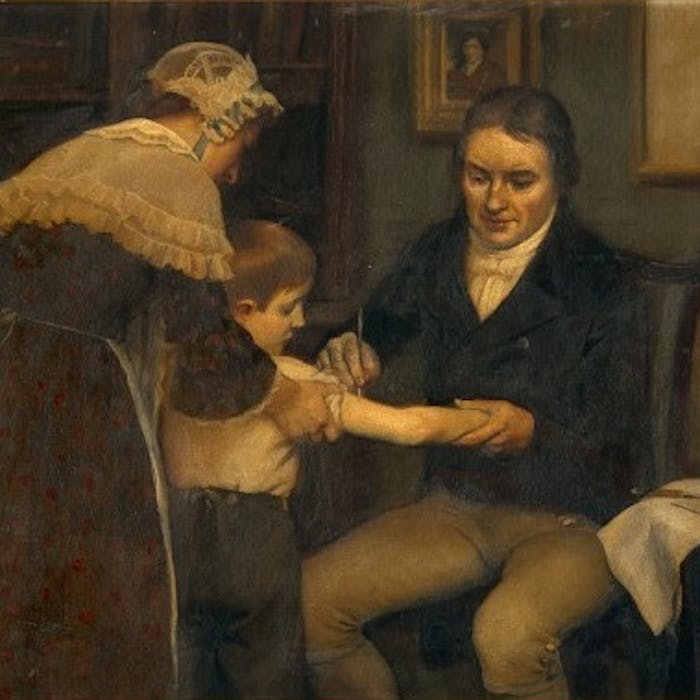
Edward Jenner and the invention of the vaccine
Englishman Edward Jenner is considered the founder of vaccinology in the West in 1796, after he inoculated a 13 year-old-boy with vaccinia virus (cowpox), and demonstrated immunity to smallpox. In 1798, the first smallpox vaccine was developed.
The much-feared infectious disease smallpox has probably existed since at least 10,000BC, arising possibly in Africa and spreading from the Ancient Egyptians to India, and then further east and west, arriving in Europe through the Roman Empire. Epidemics of the disease have had a huge effect on world history and the fall of civilisations. The death rate from smallpox was high, and one third of the survivors went blind. Many were also disfigured, with the matrimonial chances of young women particularly affected.
Survivors, however, were known to be immune for life from any further attacks of the disease.
By the 1700s, it was relatively well known in rural England that another group of people seemed to be immune to smallpox. Milkmaids instead contracted a relatively mild cattle disease called cowpox, which left little scarring.
Edward Jenner was a country doctor working in the small town of Berkeley in Gloucestershire. He had trained in London under one of the foremost surgeons of the day. Jenner was interested in curing smallpox and had heard the tales that dairymaids were protected from smallpox naturally after having suffered from cowpox. Pondering this, Jenner concluded that cowpox not only protected against smallpox but also could be transmitted from one person to another as a deliberate mechanism of protection.
In 1796, he took some pus from cowpox lesions on the hands of a young milkmaid, Sarah Nelms, and scratched it into the skin of eight-year old James Phipps. After a few days of mild illness, James recovered sufficiently for Jenner to inoculate the boy with matter from a smallpox blister. James did not develop smallpox, nor did any of the people he came into close contact with.
Jenner realised that his smallpox vaccine – the name derived from the Latin for cowpox, vaccinia – had the potential to transform medicine and save lives. He chose not to patent his discovery, but instead wrote to other doctors encouraging them to follow his example.
He even converted a rustic summerhouse in his garden into his Temple of Vaccinia and invited local people to be vaccinated after church on Sunday.
From these beginnings, the war against smallpox began. Over the 18th and 19th centuries, systematic implementation of mass smallpox immunisation culminated in its global eradication in 1979.
Further reading
A brief history of vaccination - The Immunisation Advisory Centre
Edward Jenner and the history of smallpox and vaccination - US National Library of Medicine
Links to external websites are not maintained by Bite Sized Britain. They are provided to give users access to additional information. Bite Sized Britain is not responsible for the content of these external websites.
